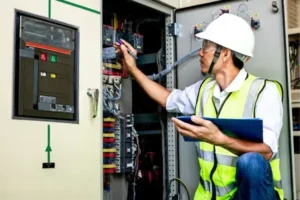Best electrical engineer online courses with certificate
Discover the best electrical engineer online courses with certificates. Advance your career with top-rated programs designed for aspiring and experienced electrical engineers.
If you’re looking to boost your skills in electrical engineering, online courses with certificates offer the perfect opportunity to learn from industry experts at your own pace.
With a wide range of topics covering circuits, power systems, and automation, these courses are tailored for both beginners and professionals.
Why Choose Electrical Engineer Online Courses?
Electrical engineering is a dynamic and ever-evolving field. Enrolling in online courses allows you to:
- Gain in-depth knowledge of specialized topics.
- Enhance your career prospects with certificates recognized by employers.
- Study flexibly while balancing other commitments.
- Learn from leading institutions and industry experts without location constraints.
The ability to access high-quality education remotely is a game-changer for aspiring engineers.
Online platforms provide a diverse range of courses, from beginner-level introductions to highly specialized programs.
Moreover, these courses often incorporate the latest industry trends, allowing learners to stay ahead in their field.
For professionals already working in the industry, these programs offer a way to upgrade their skills without disrupting their careers.
Whether you aim to explore new areas, deepen existing knowledge, or gain a competitive edge, online courses are an effective and accessible solution.

How to Select the Best Electrical Engineer Online Courses
Choosing the right course is crucial for achieving your career goals. Here are some factors to consider:
- Relevance to Career Goals: Ensure the course covers topics aligned with your current job or future aspirations. For instance, if you’re interested in automation, select a course focusing on control systems.
- Accreditation: Opt for programs from reputable institutions or platforms like Coursera, edX, or Udemy, as these certificates are widely recognized.
- Course Content: Review the syllabus to ensure it covers both foundational and advanced topics, such as circuit analysis, renewable energy systems, and automation.
- Duration and Flexibility: Assess whether the course duration fits your schedule, especially if you’re balancing work or studies.
- Certification: Verify that the program offers a valid certificate that can enhance your resume.
- Reviews and Ratings: Check feedback from previous learners to gauge the course’s quality and relevance.
By investing time in researching the right course, you can maximize your learning experience and ensure it aligns with your personal and professional goals.
The effort spent in selecting the ideal program will pay off in the form of improved skills and better career opportunities.
Top Electrical Engineer Online Courses with Certificate
Here’s a detailed look at some of the best online courses for electrical engineers.
These programs cater to a range of skill levels and career goals, ensuring there’s something for everyone.
1. Introduction to Electrical Engineering (edX)
- Institution: Massachusetts Institute of Technology (MIT)
- Overview: This foundational course explores the basics of electrical circuits, signals, and systems. It provides hands-on experience through simulations and problem-solving exercises.
- Key Topics: Circuit theory, signal processing, and system analysis.
- Duration: 10 weeks (self-paced)
- Certification: Yes (verified by MIT)
- Who It’s For: Beginners looking to build a strong foundation in electrical engineering principles.
This course stands out for its comprehensive curriculum and rigorous academic approach.
Learners are introduced to key concepts in electrical engineering, such as voltage, current, and circuit components, through engaging lectures and interactive simulations.
The course also includes regular assessments, ensuring participants can apply what they’ve learned.
By completing this program, you gain not only theoretical knowledge but also practical insights that can be applied in real-world scenarios.
The certification from MIT further adds credibility to your resume, making it a valuable asset for anyone pursuing a career in electrical engineering.
2. Electrical Engineering for Beginners (Udemy)
- Institution: Udemy
- Overview: A beginner-friendly course that introduces electrical concepts, circuit design, and power systems. With bite-sized lessons, it’s perfect for those just starting.
- Key Topics: Circuit components, safety procedures, and basic electrical tools.
- Duration: 15 hours (on-demand video)
- Certification: Yes
- Who It’s For: Students and hobbyists with no prior experience in electrical engineering.
Udemy’s course provides a highly accessible entry point into electrical engineering.
Its structured lessons cover fundamental concepts, such as understanding circuit diagrams and using basic tools.
The course also emphasizes practical applications, with projects designed to help learners build simple circuits and troubleshoot common issues.
Additionally, the affordable pricing and lifetime access make it an attractive option for budget-conscious learners.
Completing this course equips you with a strong foundation, enabling you to confidently explore more advanced topics in the future.
3. Power System Analysis and Design (Coursera)
- Institution: University of Colorado Boulder
- Overview: This course delves into power systems, focusing on design, analysis, and optimization. It’s ideal for professionals aiming to advance their expertise in energy systems.
- Key Topics: Load flow analysis, system protection, and renewable energy integration.
- Duration: 4 months (flexible schedule)
- Certification: Yes (accredited by the university)
- Who It’s For: Intermediate learners and working professionals.
This advanced course offers an in-depth exploration of modern power systems, making it perfect for engineers looking to specialize in this area.
The program combines theoretical lectures with hands-on projects, allowing learners to tackle real-world challenges in energy distribution and system design.
Topics like renewable energy integration and smart grid technologies are particularly relevant in today’s market.
Completing this course not only enhances your technical knowledge but also positions you as a competitive candidate for roles in energy and infrastructure projects.
4. Automation and Control Systems (edX)
- Institution: Delft University of Technology
- Overview: Focuses on automation technologies and control systems in electrical engineering. It covers both theoretical and practical aspects of automation.
- Key Topics: Sensors, actuators, PLC programming, and robotics.
- Duration: 8 weeks
- Certification: Yes
- Who It’s For: Professionals seeking to enhance their skills in automation.
Delft University’s course is tailored for engineers aiming to specialize in automation and control systems.
It covers a broad range of topics, including sensor technology and programmable logic controllers (PLCs).
The program emphasizes practical learning, with case studies and interactive labs that simulate real industrial scenarios.
Whether you’re designing automation solutions for manufacturing or exploring robotics applications, this course provides the tools and knowledge to excel.
The certification further demonstrates your expertise in a high-demand field.
5. Electrical Circuit Analysis (Khan Academy)
- Institution: Khan Academy
- Overview: A comprehensive, free resource for learning about circuit components and their interactions. While it doesn’t offer a certificate, it’s a great starting point for students.
- Key Topics: Resistors, capacitors, inductors, and circuit laws.
- Duration: Self-paced
- Certification: No
- Who It’s For: Anyone looking for a free, accessible introduction to circuit analysis.
Khan Academy’s course is an excellent option for those seeking a cost-effective way to learn the basics of circuit analysis.
Its self-paced format allows learners to progress at their own speed, making it ideal for students with varying levels of prior knowledge.
Interactive quizzes and video tutorials ensure that learners can apply theoretical concepts to practical problems.
While the absence of a certificate may limit its appeal for professionals, the quality of the content makes it an invaluable resource for foundational learning.
What You Will Learn in the Course
When you enroll in an electrical engineering online course, you gain access to a broad range of topics and skills tailored to meet industry demands. Here are some key areas you can expect to cover:
Circuit Analysis and Design
Gain a thorough understanding of electrical circuits, including the behavior of resistors, capacitors, and inductors. Learn to analyze and design circuits using tools like Kirchhoff’s laws and Thevenin’s theorem. Practical assignments often include simulating circuits with specialized software, helping you build real-world problem-solving skills.
Power Systems and Renewable Energy
Understand the intricacies of power generation, transmission, and distribution. Explore modern advancements in renewable energy sources, such as solar and wind power, and learn how they integrate with traditional grid systems. Courses often include case studies on energy optimization and sustainability.
Automation and Control Systems
Master the essentials of automation technologies, such as programmable logic controllers (PLCs), sensors, and actuators. Delve into the design and implementation of control systems used in industrial applications, gaining skills that are highly valued in manufacturing and robotics.
Signal Processing and Electronics
Develop expertise in analyzing and manipulating electrical signals. Topics include Fourier transforms, signal filtering, and modulation techniques. Additionally, you’ll gain insights into the design and functionality of essential electronic components, which are foundational to telecommunications and circuit development.
Electrical Safety and Standards
Learn critical safety protocols and industry standards to ensure compliance and safety in electrical engineering projects. This includes understanding electrical codes, risk assessment, and implementing safety measures in various environments.
Software Tools and Applications
Become proficient in industry-standard tools such as MATLAB, AutoCAD, and SPICE. These software applications are essential for modeling, simulating, and analyzing complex electrical systems, ensuring you are prepared for modern engineering challenges.
By the end of the course, you’ll not only have a comprehensive understanding of electrical engineering concepts but also the practical skills required to excel in your career.
Benefits of Earning Certificates in Electrical Engineering
Earning a certificate in electrical engineering comes with numerous advantages, making it a worthwhile investment for your career.
Enhanced Credibility
A certificate from a reputable institution validates your skills and knowledge in electrical engineering.
It demonstrates to employers that you’ve undergone formal training and are equipped to handle industry challenges.
This added credibility can set you apart from other candidates, especially in competitive job markets.
Career Advancement
Certifications often act as a gateway to better job opportunities and higher salaries.
They showcase your commitment to professional growth, increasing your chances of being considered for promotions or advanced roles.
Employers value candidates who actively seek to improve their skills, and certificates provide tangible proof of your efforts.
Networking Opportunities
Many online courses include forums or collaborative projects, allowing you to connect with peers and industry professionals worldwide.
These networks can lead to mentorships, partnerships, and even job opportunities, expanding your professional circle significantly.
Skill Validation
Certificates serve as official recognition of your expertise in specific areas of electrical engineering, such as circuit analysis or power systems.
They reassure employers and clients of your abilities, boosting your confidence in tackling complex projects.
Flexibility and Accessibility
Online courses provide the flexibility to learn at your own pace, making it easier to balance education with work or personal commitments.
This accessibility ensures that even those with busy schedules can invest in their professional development.
Enrolling in electrical engineer online courses with certificates is a smart move for anyone looking to stay competitive in this ever-evolving field.
Whether you’re a beginner or an experienced professional, these courses provide the tools and knowledge to excel.
Don’t wait! Explore the options listed above and invest in your future today.
Each course is a step closer to achieving your professional goals in electrical engineering.





